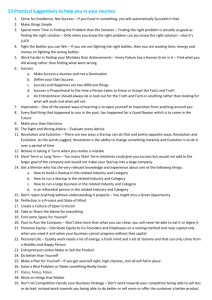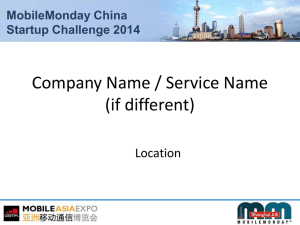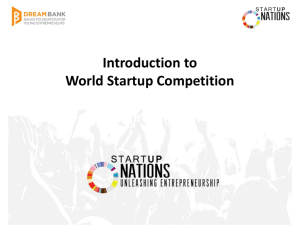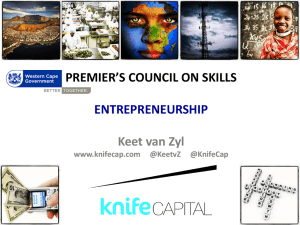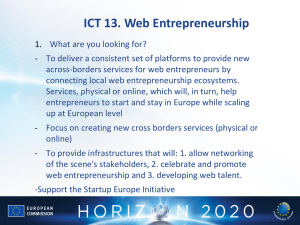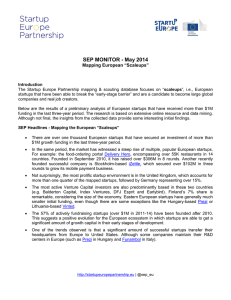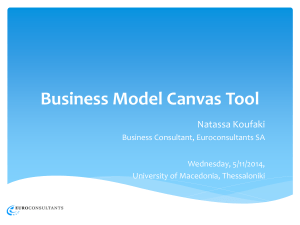Feature-Startup_TwentyWhat_Manuscript_LaFaro_031912
advertisement
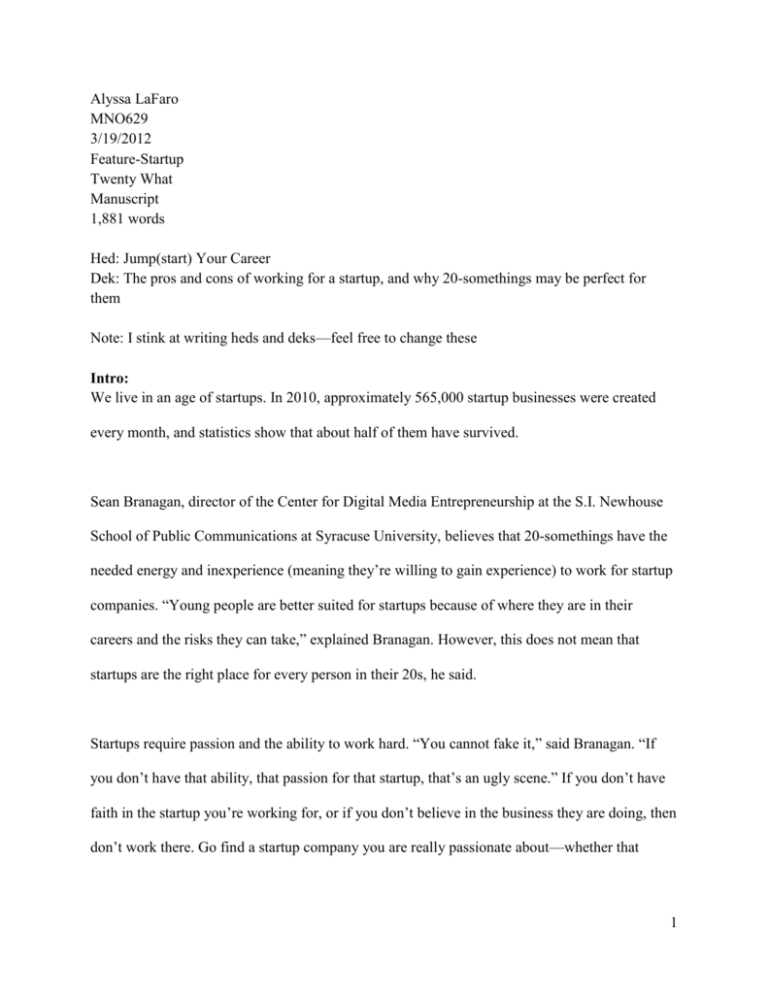
Alyssa LaFaro MNO629 3/19/2012 Feature-Startup Twenty What Manuscript 1,881 words Hed: Jump(start) Your Career Dek: The pros and cons of working for a startup, and why 20-somethings may be perfect for them Note: I stink at writing heds and deks—feel free to change these Intro: We live in an age of startups. In 2010, approximately 565,000 startup businesses were created every month, and statistics show that about half of them have survived. Sean Branagan, director of the Center for Digital Media Entrepreneurship at the S.I. Newhouse School of Public Communications at Syracuse University, believes that 20-somethings have the needed energy and inexperience (meaning they’re willing to gain experience) to work for startup companies. “Young people are better suited for startups because of where they are in their careers and the risks they can take,” explained Branagan. However, this does not mean that startups are the right place for every person in their 20s, he said. Startups require passion and the ability to work hard. “You cannot fake it,” said Branagan. “If you don’t have that ability, that passion for that startup, that’s an ugly scene.” If you don’t have faith in the startup you’re working for, or if you don’t believe in the business they are doing, then don’t work there. Go find a startup company you are really passionate about—whether that 1 passion is in their market, the people there, or the greater good that company is providing by its service—because that is what will make you a success there. It’s also important to realize that startups go out of business a lot. “Well over 50% of them will fail,” explained Branagan. But this only makes the opportunity to work for one greater. Yes, you are more likely than not to find yourself out of the job at some point in a startup, but you will gain experience there that you probably would not have gained anywhere else. The responsibility given to young people in startups is much greater than any responsibility they would be given at established companies. The other benefit is surviving the failure and coming back from that with even more drive and force. “You find out if the rollercoaster is right for you,” said Branagan. “If you got used to the rollercoaster and decide you want to go around again, even though it scared the crap out of you, that’s what startups want. They want someone who’s gone through it before, good and bad, because you would do things differently the next time.” Anecdotes: Chris Kennedy, Wireless Zone Chris Kennedy, 29, works for the Wireless Zone in Geneva, N.Y. The Wireless Zone is a privately owned, small business that sells cell phones, phone plans, and data packages through the larger Verizon Wireless conglomerate. The Wireless Zone currently employs five guys between the ages of 26 and 30. 2 Chris worked full time at the Wireless Zone from 2006-2010, but rejoined the team in August 2011 as a part-time employee. He has always been welcomed back as he is friends with the owner. Unfortunately, this is what has also pushed him away from the business. “My boss and I were friends before we were coworkers here at the Wireless Zone,” explained Chris. “This makes thing a bit complicated, and the hierarchy ends up compromised. I thought of us as equals, when in reality he thought of us as supervisor (owner) and employee. It almost destroyed our friendship.” It wasn’t always like this, Chris explained. In the beginning, he really enjoyed working with a bunch of his 20-something friends at a startup business. As time went on, however, the bossemployee relationship became strained. Chris has learned a lot from working at the Wireless Zone. “Startup businesses are not good for long term employment,” said Chris. “In my case, it was a great job for a college student to work full time or pick up hours while at another full time job. There was nowhere for me to advance, though.” Chris also feels that working in a commission-based business with your friends doesn’t make for the best environment. “There is always competition, and it causes dissension in the ranks of the employees and can cause the end of friendships over money,” he stressed Overall, Chris doesn’t recommend startups as long term endeavors. Although he had some job security, could get away with a lot more, and experienced some level of fun at the Wireless 3 Zone, he believes that the conflict between friends (owner vs. employee and employee vs. employee) leaves room for too much drama and not enough career advancement opportunities. Jennifer Corton, graFighters Jennifer Corton, 22, is in her final year as an advertising design major at Syracuse University’s College of Visual and Performing Arts. She has worked with a lifestyle startup business called graFighters since 2010. graFighters is an online game, in which players design and draw their own characters, and then scan them into the computer. The website then rates your character’s skills in regard to characteristics like strength, agility, and intelligence. The characters then battle to death. Unlike Chris, Jennifer is truly passionate about her work with graFighters, which is one of the characteristics Branagan believes is necessary to work for a startup company. “I love working for graFighters,” said Jennifer. Even though Jennifer enjoys working for graFighters, she realizes that her passion comes with patience. “I've learned that things aren't immediate and if you love something, you're going to have to work on it for a while before anything happens,” she explained. What Jennifer appreciates about this startup is that it’s a small and intimate. “Big companies make me feel lost in the system, and I end up doing what seems like gopher work,” said Jennifer. “In a startup, everyone is fully committed, super collaborative, and excited about the company or idea. Having the startup energy at the sandbox inspires me to do so much more.” 4 Jennifer only recommends working for a startup company to someone who is passionate and not interested in large profits. She didn’t start getting paid until after she completed one year of interning without pay for graFighters. “Money should never be in the front of the mind,” she explained. Most importantly, Jennifer feels that working for a startup, especially graFighters, has given her the confidence to stand on her own two feet as a freelance illustrator. It’s helped her realize that she can pursue her passion and get paid for it. “I have so much fun when I'm drawing or coming up with ideas that the line between work and play blurs,” she said. Ethan Austin, GiveForward Ethan Austin was 27 years old when he began working with GiveForward, a non-for-profit company that provides fundraising pages for those who would like to raise money for the people and causes that need it most. Today, at age 30, Ethan is the chief operating officer for the business. In the startup world, Ethan believes that you can’t spend too much time moping around about your failures or even patting yourself on the back for your successes. He believes this both those things are a waste of energy. Instead, continue to work you fanny off in whatever startup business you’re involved in, and eventually, you will get lucky. “Success = 75% hustle + 25% luck,” said Ethan in his blog entitled “Startups and Burritos.” One simple tip Ethan recommends for working in startups is to show up. “You know that average looking dude with the really hot girlfriend? You know how he pulled that off? He 5 showed up. He asked her out when everyone else thought she was out of their league,” wrote Ethan. According to Ethan, this same rule can apply to the startup world. If you want to be part of a startup simply go do it and dive in head first. In general, Ethan believes you should strive for a job you’re passionate about and pursue it for as long as it takes. And when it comes to the startup world, this is his number one piece of advice for anyone involved: “Don’t try to out-smart your competition. Just make sure you out-care your competition.” Sidebar 1: 6 Qualities that Make 20-Somethings Perfect for Startups Stamina. Only in our 20s, we are young enough to handle the heavy workloads and long hours at the office. “This isn’t a 40 hour per week job, and nobody’s paying you for 40 hours,” explained Sean Branagan. “You’re going to work crazy hours.” Poverty. Most of us, especially those fresh out of college, are far from flush with cash. We’ve adapted to this kind of lifestyle, and we have taught ourselves how to clothe, feed, and shelter ourselves with the least amount of financial burdens necessary. “One of the great advantages of some of these innovations is they’ve been developed on a shoestring, and it doesn’t cost as much to buy this amazing product because startup employees think nobody has that kind of money,” said Branagan. Rootless-ness. The happenings at startup companies are unpredictable—one week you may be doing work from the comfort of your home and the next, you could get sent to Boston, Los 6 Angeles, Tokyo. Anything is possible. “You’re able to slide and move around, which is what’s needed a lot of the time,” said Branagan. “20-somethings are in a position in life where that’s less of a big deal.” Because we are so young, we lack the things that hold us back when we’re older—children, spouses, everyday responsibilities. This makes it easier for us to pick and move whenever, wherever. Colleagues. College provides us with one of the most diverse atmospheres we will ever be placed in during our lifetime. This diversity contributes to our ever-growing network, giving us a variety of colleagues with a multitude of skill sets. Whenever we come across a job that needs to be done in our startup, it is easier for us to hire someone because it is likely we know someone who will do the job quickly and for a reasonable fee. Ignorance. Ignorance puts aside all the conventions that say something is impossible. If we believe that we can do something, like run a successful startup, than we are more likely to succeed than not. “The advantage of that ignorance is that nobody’s beat it out of you in the business world. Ignorance is empowerment,” explained Branagan. Low-cost. Being so young, we are more used to, and perhaps, we should be more open to working for the knowledge, the lessons learned, rather than for the money. “You’re going to gain more from the experience than the dollars,” said Branagan. “Learn everything you can, work your tail off, and be everything your business card says you are.” 7 Sidebar 2: 5 Types of Startup Businesses Lifestyle Small Business Highly Scalable Big Business Social Venture Lifestyle. These startups are funded by someone who has a particular passion he/she wants to pursue in a business sense. Example: graFighters Small Business. This kind of startup is about opportunity and seeing a gap in the market. Example: Wireless Zone Highly Scalable. A highly scalable (or high tech) startup is a business that does well quickly. Basically, it’s a moon shot—it will be a billion dollar business or it will fail. Example: Craig’s List Big Business. Big business startups, also called spinouts, are large operations that see the opportunity to reach a new market and take advantage of it. Example: Google Social Venture. Social venture startups are created by social entrepreneurs who strive to accomplish a sustainable, social objective. Example: GiveForward Sources: http://money.cnn.com/2011/03/07/smallbusiness/new_business_starts/index.htm Sean Branagan—(315) 443-6310; sbranagan@c3strategic.com Chris Kennedy—(315) 521-4062; ckennedy1944@gmail.com Ethan Austin— ethan@giveforward.com 8 Jennifer Corton—(914) 439-2145 jlcorton@syr.edu http://grafighters.com/blog/about/ http://ethansaustin.com/2011/11/09/success-hustle-luck/ http://ethansaustin.com/2012/01/08/a-2012-new-years-resolution-that-will-change-your-lifeshow-up/ 9
